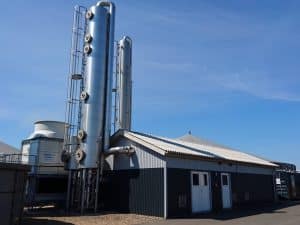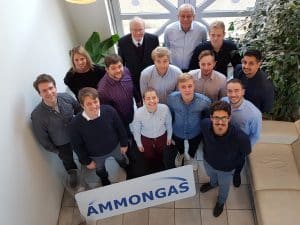
Biogas is one of the smart solutions to climate change, says clean tech expert
Inventor’s catch phrase is ‘there has to be a better way’
System delivers 99% upgrading efficiency
“You can’t achieve net zero without biogas”
 Anker Jacobsen is the founder and CEO of Ammongas, a Danish manufacturer of an innovative biomethane upgrading system. It was only by chance that it was developed. WBA editor Jon Hughes speaks with the inspirational inventor.
Anker Jacobsen is the founder and CEO of Ammongas, a Danish manufacturer of an innovative biomethane upgrading system. It was only by chance that it was developed. WBA editor Jon Hughes speaks with the inspirational inventor.
By rights Anker Jacobsen should be retired. Indeed, it was while considering what to do with his increased leisure time that the now 74-year-old fortuitously visited a biogas plant.
The operator had a problem. His plant supplied biogas to a district heat network via a 3km pipe. The problem? “He was producing too much biogas! More than was needed. Then he said, I have a dream, of upgrading the excess to biomethane and putting it into the grid.”
But there was no affordable solution to hand for the farmer. That set Anker thinking, and the retirement plans were put on hold.
“I had a choice whether to retire or to be working with nice people and doing something for the benefit of the whole of society and environment, and I thought I’d like to do that,” he says.
Upgrader delivers more biomethane for less costs
As a development engineer Anker enjoyed a hugely successful career in the oil and gas industry, ‘but never on the black side’ he hastens to add.
For Anker it has always been about clean tech, cleaning up processes, protecting the environment, minimizing waste. As a young man he patented and developed a system to capture and utilize petrol vapours that would otherwise drift into the atmosphere. For 20 years his previous company built plants to do just that.
 He always believed the core principles of the system could be applied to other processes and was exploring the possibility of capturing ammonia from polluted air and water when he visited the farmer’s biogas plant. And when he heard of the farmer’s dilemma, he realized this was a potential solution.
He always believed the core principles of the system could be applied to other processes and was exploring the possibility of capturing ammonia from polluted air and water when he visited the farmer’s biogas plant. And when he heard of the farmer’s dilemma, he realized this was a potential solution.
A pilot plant was quickly developed and proved highly successful. Subsequently it has been installed on 20 plants in Denmark, Norway and Finland.
The upgrading technique uses amine to separate the CO2 and H2S from the biogas to deliver biomethane, using a very low parasitic load per m3 of biogas. The system uses lower pressures compared with those that employ more traditional upgrading solutions, which reduces the maintenance requirements and increases availability.
“We’re different from our competitors, as in our system we don’t need to compress to high pressure,” says Anker. “Most need to compress methane and CO2, we just need to compress the methane so our demand for compression is low.”
 Where Ammongas has service agreements the system achieves a conversion rate of over 99%, essentially delivering more biomethane at less cost.
Where Ammongas has service agreements the system achieves a conversion rate of over 99%, essentially delivering more biomethane at less cost.
“We have a dynamic team of young engineers who are all dedicated and accepted to be part of a team that offers 24/7 support. They can monitor the process from home,” he says with pride.
Biogas will replace fossil gas in the next 10-15 years
“There has to be a better way” is Anker’s catchphrase. “We need to be smart and find better technological solutions so we can keep the living standards we enjoy today and the lifestyles we enjoy today. Biogas is one of those smart solutions,” he says.
He predicts that “in the next 10-15 years we will replace natural gas completely”. His confidence stems from the fact that Denmark is committed to 70% renewable energy by 2030 and 100% by 2050. “And,” he says, “that is not possible without biogas.”
“Biogas is growing far faster than wind turbines ever did,” he says. In Denmark 50% of renewable energy is generated by the wind farms that have been developed over the past 20-30 years. By comparison biogas has achieved 20% over less than five years, using about 20% of available manures and organic wastes. “It is a proven technology and very possible to develop fast,” says Anker. “There’s a very big grid for natural gas in Denmark, and very easy for biogas to be put into the grid.”
The other factor that makes him optimistic is that “there is a growing movement in Denmark for us as a nation to become greener”. This shift in public opinion is a great opportunity for biogas to fulfil its potential.
“Biogas does a lot of very good things,” says Anker. “By taking the organic fraction and making biogas, we are helping the whole of society, preventing the release of climate change emissions and reducing air pollution and creating thousands of jobs. With it, the vision of a greener world is one step closer.”
And so it is, thanks to solutions driven people like Anker.
Do you know a biogas hero? If you do, please email jon.hughes@worldbiogasassociation.org

